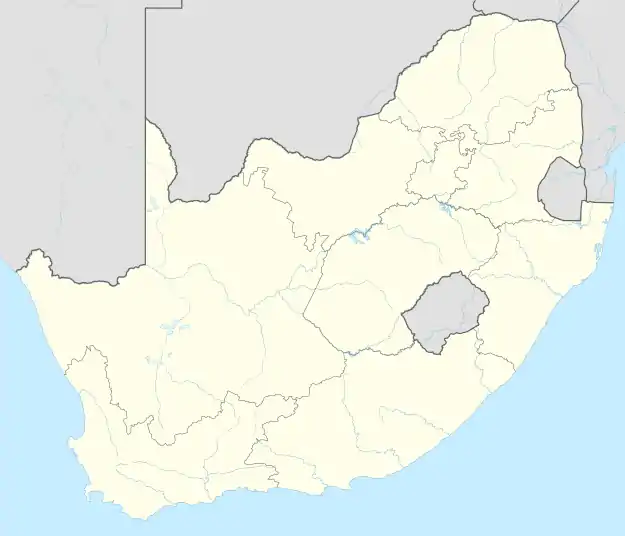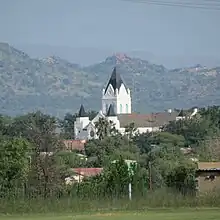Bethanie, North West
Bethanie is a town in Bojanala District Municipality in the North West province of South Africa.

Bethanie | |
|---|---|
 Bethanie  Bethanie | |
| Coordinates: 25.554°S 27.606°E | |
| Country | South Africa |
| Province | North West |
| District | Bojanala |
| Municipality | Rustenburg |
| Government | |
| • Paramount Chief | Mamogale |
| Area | |
| • Total | 27.87 km2 (10.76 sq mi) |
| Population (2011)[1] | |
| • Total | 8,429 |
| • Density | 300/km2 (780/sq mi) |
| Racial makeup (2011) | |
| • Black African | 99.1% |
| • Coloured | 0.1% |
| • Indian/Asian | 0.4% |
| • White | 0.1% |
| • Other | 0.3% |
| First languages (2011) | |
| • Tswana | 79.2% |
| • Zulu | 5.2% |
| • English | 4.8% |
| • Tsonga | 2.1% |
| • Other | 8.7% |
| Time zone | UTC+2 (SAST) |
| Postal code (street) | 0260 |
| PO box | 0270 |
| Area code | 012 |
Bethanie is a station of the Hermannsburg Mission, established in 1864, and located 37 km northeast of Rustenburg. The name is of biblical origin (Matthew 26:6, Mark 14:3 Mark 11:1), and is Hebrew for 'house of sorrow or misery'.[2]
Bethanie is the capital town of Bakwena Ba Mogopa, a SeTswana-speaking traditional community.
Demographics
The station hosts multiple races.
History
It is one of 15 villages that form part of Bakwena Ba Mogopa nation. The village was previously a farm called Losperfontein, owned by Tjaart Kruger, President Paul Kruger's younger brother. The community purchased the farm around 1866, with the assistance of missionary Wilhelm Behrenssen, and it was renamed Bethanie.
Facilities
Bethanie has a police station that renders services to nearby[3] places such as Modikoe and Berseba.

A view of Bethanie, with the iconic Lutheran Church a centerpiece.
|
|---|
References
- "Main Place Bethanie". Census 2011.
- Raper, Peter E. (1987). Dictionary of Southern African Place Names. Internet Archive. p. 76. Retrieved 28 August 2013.
- "Police Station ( Bethanie )".
.svg.png.webp)